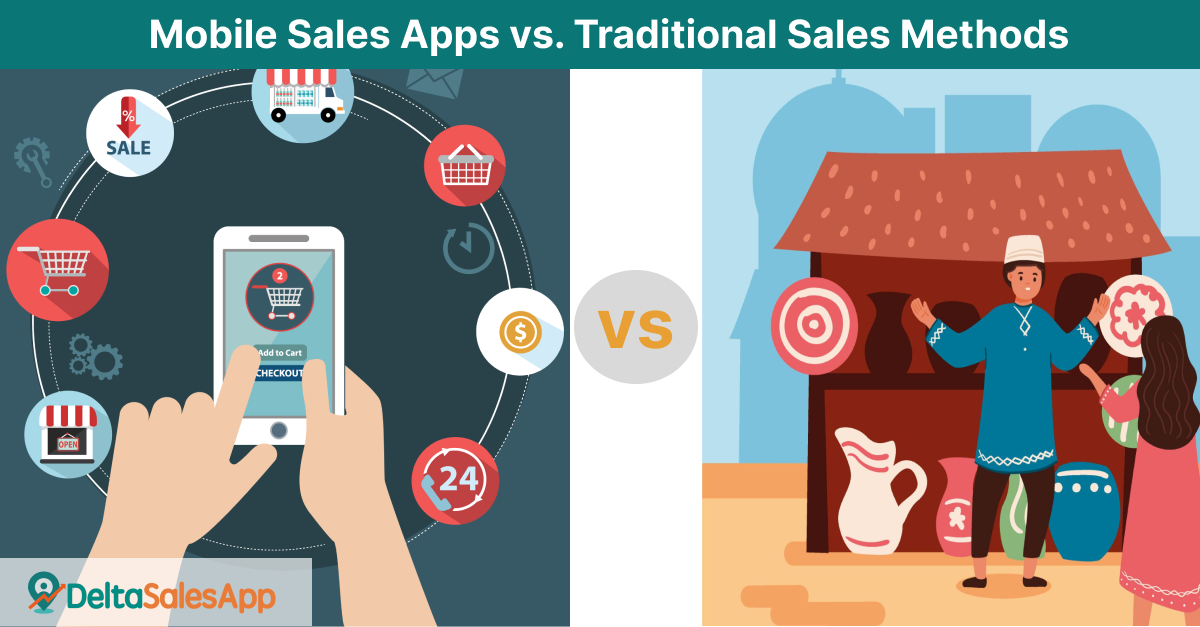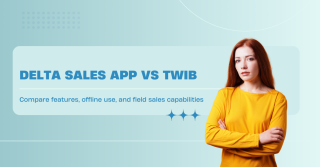Mobile Sales Apps Vs.Traditional Sales Methods

In today's fast-paced business world, the way we sell products and services has evolved significantly. With the advent of mobile technology, sales teams are presented with new tools and strategies that can greatly impact their effectiveness. This article will explore the differences between mobile sales apps and traditional sales methods, providing insights into their advantages and disadvantages.
Mobile Sales Apps: The New Frontier in Sales
Mobile sales apps have transformed the way businesses engage with customers. These apps empower sales teams to access crucial information and customer data on the go, making the sales process more efficient and customer-centric. Whether you're a B2B or B2C business, having a mobile sales app can be a game-changer.
One of the biggest advantages of mobile sales apps is their ability to provide real-time data and analytics. Sales teams can monitor customer interactions, track sales leads, and analyze market trends, all from the convenience of their mobile devices. This immediate access to data enables informed decision-making and more effective sales strategies.
The Role of Mobile Marketing Automation Platforms
Mobile marketing automation platforms take mobile sales apps to the next level. These platforms integrate seamlessly with mobile sales apps to provide a holistic solution for businesses. They allow for the automation of various marketing tasks, including sending out app messages to customers.
Harnessing the Power of App Messages
App messages sent through mobile marketing automation platforms are a powerful tool for engaging customers. These messages can be personalized and tailored to each customer's preferences and behavior. Whether it's notifying customers about promotions, product updates, or personalized recommendations, app messages ensure that your customers stay informed and engaged.
The advantage of app messages lies in their immediacy and directness. Unlike traditional sales methods, where reaching customers may take time, app messages instantly land in the palm of the customer's hand. This real-time communication can significantly boost customer engagement and conversion rates.
Furthermore, mobile marketing automation platforms enable sales teams to track customer responses to app messages. By analyzing open rates, click-through rates, and conversion rates, businesses can fine-tune their sales strategies and ensure that their messages are hitting the mark.
The Power of Mobility: Mobile Sales Apps
- The Rise of Mobile Sales Apps
In the digital age, mobile sales apps have become indispensable tools for sales professionals. These apps are designed to enhance efficiency and productivity by providing a wide range of features tailored to sales activities.
- Convenience and Accessibility
One of the primary benefits of mobile sales apps is their accessibility. Sales teams can access crucial information and resources from anywhere, eliminating the need to be tethered to a desk. This flexibility allows for better customer interactions and the ability to close deals on the go.
- Real-Time Data and Analytics
Mobile sales apps offer real-time data and analytics, giving sales reps a competitive edge. These apps provide insights into customer behavior, enabling sales professionals to make informed decisions and adjustments in their strategies.
- Improved Communication
With mobile sales apps, communication with customers and within the sales team is streamlined. Features like instant messaging, email integration, and video calls facilitate better collaboration and faster response times.
The Traditional Approach
- Personal Touch and Relationship Building
Traditional sales methods rely on personal interactions and relationship building. Face-to-face meetings, phone calls, and handshakes can establish trust and rapport that may be more challenging to achieve through digital means.
- Legacy Clientele
Some customers prefer traditional sales methods due to familiarity and trust in established practices. Salespeople who have long-standing relationships with clients may find it challenging to transition to a purely digital approach.
- Slow Adoption of Technology
Not all businesses are quick to adopt new technology. Traditional sales methods continue to be effective for industries that have been slow to embrace mobile solutions.
The Hybrid Approach
- Finding the Right Balance
In many cases, a combination of mobile sales apps and traditional methods may be the most effective approach. By leveraging the strengths of both, sales teams can tailor their strategies to suit individual customer preferences.
- Customized Solutions
Hybrid sales approaches allow for customized solutions based on customer needs. Sales professionals can choose the most suitable method for each client, optimizing their chances of success.
- Adapting to Change
Adaptability is key in the modern sales landscape. Sales teams that can seamlessly transition between mobile and traditional methods have a distinct advantage in a dynamic market.
Traditional vs. Mobile Sales: A Comparative Analysis
- Reach and Audience
Traditional methods may limit your reach, while mobile apps enable you to connect with a global audience.
- Personalization
In-person sales excel in personalization, but mobile apps can use data to tailor offers to individual customers.
- Speed and Efficiency
Mobile apps speed up the sales process, while traditional methods may involve delays due to travel and manual tasks.
- Cost-Effectiveness
Traditional methods can be costly, whereas mobile apps can save money in the long term.
- Tracking and Analytics
Mobile apps provide detailed analytics, while traditional methods may struggle to collect data effectively.
Case Studies
Company A: Traditional Sales Success
Company A, a well-established B2B company, relies on in-person sales. Their success is built on strong relationships with clients and a personalized approach. However, they have high operational costs.
Company B: Mobile Sales App
Company B, a tech startup, leverages a mobile sales app for B2C sales. Their efficiency and cost-effectiveness have allowed them to rapidly grow their customer base.
Making the Right Choice for Your Business
The choice between traditional sales methods and mobile sales apps depends on various factors, including your industry, target audience, and budget. It may even involve a hybrid approach that combines the strengths of both methods.
Future Trends in Sales Methods
As technology continues to evolve, we can expect further innovations in sales methods. Embracing new tools and strategies will be essential for businesses to stay competitive in the ever-changing market.
Conclusion
The debate between mobile sales apps and traditional sales methods is not a matter of one being superior to the other, but rather a question of choosing the right tool for the job. The choice between mobile sales apps and traditional sales methods depends on the specific needs and priorities of a business. While mobile apps offer numerous advantages in terms of accessibility, efficiency, and data accuracy, traditional methods may still be preferred in situations where personal, face-to-face interactions hold significant value. Many businesses today are adopting a hybrid approach, combining the strengths of both methods to maximize their sales effectiveness. Sales professionals must adapt to the changing landscape and be open to the benefits of both approaches.
FAQs
Q. Are mobile sales apps suitable for all industries?
Mobile sales apps are versatile and can be customized for various industries, but their effectiveness may vary depending on the nature of the business.
Q. Do traditional sales methods still have a place in the digital age?
Traditional sales methods continue to be relevant, especially in industries where personal relationships and trust play a significant role.
Q. How can sales teams transition to mobile sales apps effectively?
Successful transition involves training, a phased approach, and ongoing support for sales teams to adapt to mobile sales apps.
Q. What are the security concerns with mobile sales apps?
Mobile sales apps should address data security and privacy concerns, ensuring that customer information remains protected.
Q. Can a hybrid approach be customized for individual customers?
Yes, a hybrid approach allows sales professionals to tailor their strategies to individual customer preferences, optimizing their chances of success.
Q. Do mobile sales apps work better for B2B or B2C sales?
Mobile sales apps can be effective in both B2B and B2C sales, but the choice depends on your industry and target audience.
Q. Can traditional sales methods and mobile apps be integrated?
Yes, businesses can integrate both methods to create a hybrid approach that combines personalization with efficiency.
In this age of digital transformation, the choice between mobile sales apps and traditional methods can shape the future of your business. Evaluate your unique needs and objectives to determine the most effective sales strategy for your success.








